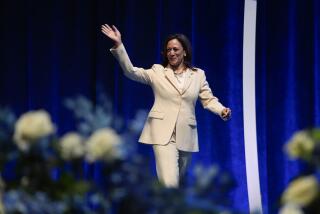Dallas-area rapes have sorority asking why
Reporting from Dallas — Betty Culbreath is normally not a fearful person. That changed when she learned that four women raped in their homes nearby were fellow Delta Sigma Theta sorority alumnae — all in their 50s and 60s.
Culbreath, 70, went out to her car and removed her Delta license plate holder. She heeded the advice of the national president of the sorority to think twice before wearing Delta clothing or accessories, much of it in the sorority’s signature color, red.
The crimes “made me fearful, more precautious,” she said. “It has made me very conscious about anything that might identify me” as a Delta Sigma Theta.
Police are confounded by why a rapist appears to be targeting older women in one of the nation’s prominent black sororities. For sorority members, the mystery underlies a dread that they could be the next victim attacked at home in the leafy Dallas suburbs of Corinth, Coppell and Plano. Here the flat land is dotted with lakes, evangelical churches and seemingly safe planned communities with names like Arbor Manors, Copperstone and Meadow Oaks.
Culbreath, former director of Dallas County Health and Human Services, is particularly alarmed by the surveillance video of a “person of interest” being sought by police, and the description of the suspect: a 275-to-300-pound tank of a man, African American, between 5 foot 7 and 5 foot 9, mid-30s or 40s, with a distinctive swagger.
“This man is so big it’s just … oh, it’s hard to think about when you reach a certain level of maturity,” she said. “It makes you wonder what kind of vendetta would cause a man to be that evil, what’s motivating him. We are a service sorority — we’re not politicians; we’re not involved in anything controversial.”
Word of the attacks spread among the nation’s “Divine Nine” black sororities and fraternities at their National Pan-Hellenic Council convention in Atlanta this week, on the Black Greek Forum, the Delta Sigma Theta Facebook page and other websites. Many people were frightened.
“This has really put a chill through everyone because we can’t figure out an explanation for it,” said Lawrence Ross, a Los Angeles-based author who is married to a Delta.
The most recent attack took place Oct. 14 in Shady Shores, and was investigated by Corinth police. The Coppell attack occurred Sept. 15. The two other assaults, in Plano, occurred in April and last November.
All four victims attended different colleges, said Plano Police Officer Andrae Smith, adding that it was too early to assume the suspect was exclusively targeting Deltas. But Plano police spokesman David Tilley said that “everybody associated with this has said it goes past coincidence.”
Brad Garrett, a retired FBI profiler who’s now a Washington-based consultant, said other criminals had targeted sororities, including serial killer Ted Bundy. But too little is known about the current suspect to be able to discern his motives, he said.
A serial rapist is “by and large fantasy-driven,” Garrett said. “There’s something that draws him. He could be trying to punish these women because they have been successful.”
Delta Sigma Theta counts many notable members, or “sisters.”
The sorority was founded by about two dozen students at Howard University in 1913, who promptly prepared to join a march in Washington for women’s suffrage.
“They were told they were going to be marching separately, in the back,” said Ross, author of “The Divine Nine: The History of African American Fraternities and Sororities.”
“They refused to do that,” he said, “so they marched with everyone else.”
Deltas would go on to fight for civil rights, staging sit-ins and campaigning against voter suppression. Both the late Rep. Shirley Chisholm (D-N.Y.), the first black woman elected to Congress, and Rep. Barbara Jordan (D-Texas), the first Southern black congresswoman, were Deltas. So was Dorothy Height, longtime president of the National Council of Negro Women.
The sorority now has 250,000 members in more than 1,000 chapters worldwide, about 76% of them alumnae, according to a spokeswoman. The list includes some of the most accomplished black women in America, including U.S. Surgeon General Regina M. Benjamin, former astronaut Joan Higginbotham, Rep. Marcia Fudge (D-Ohio) and singers Roberta Flack and Natalie Cole.
Honorary Delta and pioneering black educator Mary McLeod Bethune wrote a poem about the selfless “Delta Girl” driven by “a purpose which directs her activities and all that she may control toward lifting somebody else.”
“Deltas value leadership development,” said Tamara Brown, a Delta alumna and co-editor of a book about black fraternities and sororities.
In the growing Dallas-Fort Worth metroplex, which encompasses a dozen northern Texas counties with a population of about 6.4 million, membership in Delta Sigma Theta and the “Divine Nine” has helped locals integrate with new arrivals, said Rhetta Washington McCoy, 39, past president of a Dallas chapter of the Zeta Phi Beta sorority.
“A lot of people think sororities and fraternities and think a social club on a college campus and once college is over, you’re done,” she said. “Our organizations have more of a social service aspect.”
That’s one reason so many black alumnae in the Dallas area wear or carry sorority insignia with them, she said.
But the attacks have them thinking differently.
Staff at the sorority’s national headquarters in Washington even warned sisters in the Dallas area not to speak publicly.
Despite her fear, Culbreath said she was willing to be interviewed because she is “proud to be where I am and not hide that because some fool decided to make that the common denominator of people he attacked.”
“We are very proud of our membership. It’s a sorority made up of educated black women,” she said. “It’s a lifetime commitment. You’re proud to be one because of what the organization stands for. You wear your T-shirts or you have your license plate holder because it’s in your heart.”
“When this gentleman is caught,” she said, “we’ll go back to business as usual.”
molly.hennessy-fiske@latimes.com
More to Read
Sign up for Essential California
The most important California stories and recommendations in your inbox every morning.
You may occasionally receive promotional content from the Los Angeles Times.











